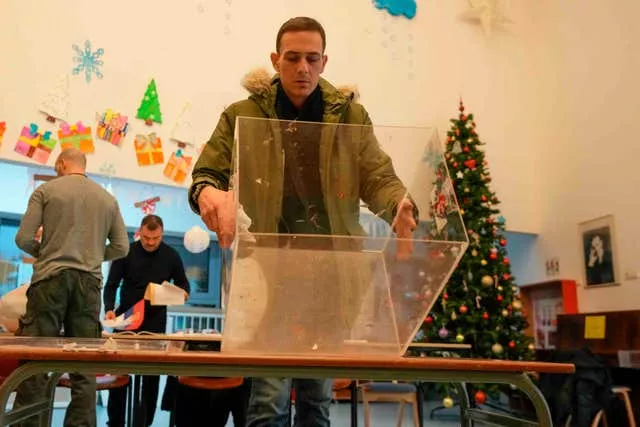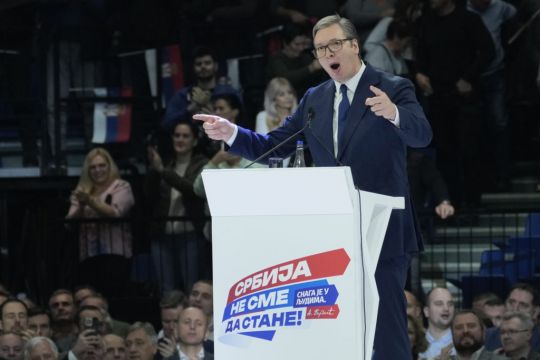Serbia’s populist President Aleksandar Vucic is seeking to further tighten his grip on power in an election on Sunday that has been marred by reports of major irregularities during a tense campaign.
The main contest in the parliamentary and local elections is expected to be between Mr Vucic’s governing right-wing Serbian Progressive Party, or SNS, and a centrist coalition that is trying to undermine the populists who have ruled the troubled Balkan state since 2012.
The Serbia Against Violence opposition list is expected to mount the biggest challenge for the city council in Belgrade. An opposition victory in the capital would seriously dent Mr Vucic’s hardline rule in the country, analysts say.

Opposition coalition leader Dragan Djilas said after casting his vote in Belgrade: “Changes in Serbia have started and there is no force that can stop that. We, as the strongest opposition list, will defend people’s will by all democratic means.”
Several right-wing groups, including pro-Russian parties and Socialists allied with Mr Vucic are also running for control of the 250-seat parliament and local councils in some 60 cities and towns, as well as regional authorities in the northern Vojvodina province.
The election does not include the presidency, but governing authorities backed by dominant pro-government media have run the campaign as a referendum on Mr Vucic.
Although he is not formally on the ballot, the Serbian president has campaigned relentlessly for the SNS, which appears on the ballot paper under the name “Aleksandar Vucic – Serbia must not stop!”
The main opposition Serbia Against Violence pro-European Union bloc includes parties that were behind months of street protests this year triggered by two back-to-back mass shootings in May.

The Serbian president has been touring the country and attending his party’s rallies, promising new roads, hospitals and one-off cash bonuses. His image is seen on billboards all over the country, though he has stepped down as SNS party leader.
Even before the vote started on Sunday, campaign monitors reported pressure on voters, fearmongering and abuse of public office and institutions fostered by the authorities. There have also been reports of vote-buying and voter-bribing.
Serbia, a Balkan country that has maintained warm relations with Vladimir Putin’s Russia, has been a candidate for EU membership since 2014 but has faced allegations of steadily eroding democratic freedoms and rules over the past years.
Both Mr Vucic and the SNS have denied allegations of campaign abuse and attempted vote-rigging, as well as charges that Mr Vucic as president is violating the constitution by campaigning for one party.
Hardly any of the complaints or recommendations by local and foreign observers have resulted in changes in the voting process.

Mr Vucic called the December 17 snap vote only a year and a half after a previous parliamentary and presidential election, although his party holds a comfortable majority in parliament.
Analysts say Mr Vucic is seeking to consolidate power after two back-to-back shootings triggered months of anti-government protests, and as high inflation and rampant corruption fuelled public discontent.
The president has also faced criticism over his handling of a crisis in Kosovo, a former Serbian province that declared independence in 2008, a move that Belgrade does not recognise.
His supporters view him as the only leader who can maintain stability and lead the country into a better future.
“I think it’s time that Serbia goes forward with full steam,” pensioner Lazar Mitrovic said after he voted. “That means that it should focus on its youth, on young people, education and of course discipline.”
Major polling agencies have refrained from publishing pre-election surveys, citing fear among Serbia’s 6.5 million eligible voters and high polarisation.







